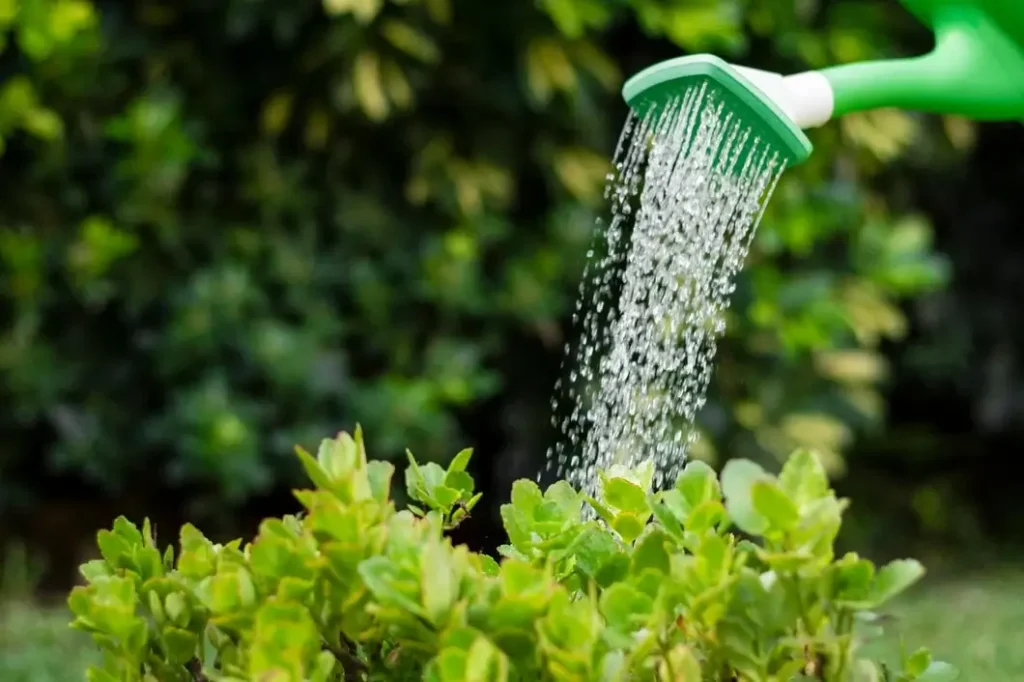Earlier today, an inquiry emerged regarding the appropriateness of utilizing well water for irrigating raised gardens. Given the considerable variability in the composition of well water, a lack of comprehensive understanding could inadvertently endanger plant health, exposing them to the risks of infection and stress, potentially leading to their demise.
Delving into the complexities of this issue, let’s examine the implications of using well water for plants. I will clarify whether it presents a threat to plant life, emphasize the significance of testing the well water, and analyze the advantages and disadvantages associated with using it as a method of irrigating your garden.
Is Well Water Good For Plants? Yes
Yes, well water can serve as a viable source for nurturing your plants; however, ensuring its freedom from contaminants, chemicals, and harmful bacteria, and applying appropriate treatment is imperative.

Although achieving optimal water quality may require some time and effort, once mastered, the utilization of well water can yield numerous benefits for irrigating your plants.
Why Water Sources Matter on Water Quality of Plants?
Water is an essential requirement for all living beings on Earth, serving as the cornerstone of life.
1. Everyday Perceptions
Water stands as a fundamental necessity for all life on Earth, serving as the cornerstone of existence.
2. Water Usage
The water employed in gardens is often overlooked, as the primary focus tends to be on ensuring adequate hydration for the plants.
3. Water as Nourishment
The water utilized in gardens is frequently underestimated, with the primary emphasis directed towards ensuring plants receive sufficient hydration.
4. Shift in Perspective
The surge in popularity of home food gardens, often referred to as “victory gardens,” is fostering a notable shift in perspective regarding the conscientious use of water.
5. Awareness
There is an increasing necessity for individuals to be mindful of the imperceptible elements in water and their potential ramifications on both human health and plant life.
The Pros and Cons Of Well Water On Plants
Utilizing well water for your plants and gardens provides undeniable advantages. However, it is crucial to be acutely aware of specific drawbacks the next time you replenish your watering can.

The Pros of Well Water on Plants
Well water offers numerous advantages, especially in the realm of garden irrigation:
1. Nutrient-Rich
Well water is advantageous for plants because of its calcium and magnesium content, essential elements for their survival.
2. Cost-Efficiency
The lack of fees to municipal authorities makes well water a cost-effective alternative for your gardening needs.
3. Sustainability
Well water stands out as a sustainable water source, as it avoids the generation of toxic runoff and refrains from the use of harmful chemicals.
The Cons of Well Water on Plants
However, in certain scenarios, well water may pose more drawbacks than benefits. Taking responsibility for the management and treatment of your water can enable its optimization to work in your favor.
1. Energy Dependency
Extraction may require electricity, although alternative options such as solar-powered pumps are available.
2. Bacterial Contamination
Being subterranean, well water is susceptible to bacterial growth, potentially leading to septic conditions that could compromise the overall water supply.
3. Variable Composition
The water content tends to fluctuate, requiring vigilant monitoring of both water levels and pH balance.
4. Portability Concerns
It may not be universally safe for consumption without undergoing proper treatment.
5. Limited Supply
Excessive usage within a short timeframe may lead to depletion, underscoring the importance of reasonable water management.
Can Well Water Kill Your Plants?
Yes, well water can harm your plants due to elevated levels of certain components such as chlorine, fluoride, salt, iron, nitrates, nitrites, or an unfavorable.

These factors can impede plant growth, resulting in symptoms like browning and yellowing leaves. It stunted growth, and increased susceptibility to infections.
Protecting Plants: Monitoring and Testing Well Water for Healthy Growth
Although the adverse impacts of well water on plants become apparent, detecting indications of mineralization, chlorination, or contamination is typically feasible before irreversible damage occurs. Vigilance is key, as prolonged exposure to unsuitable well water conditions may eventually lead to plant demise.
Regular monitoring for symptoms such as leaf discoloration or infections becomes crucial, prompting timely water testing to identify and rectify the underlying issues.
Safety Instruction to Use Well Water For Your Plant
1. Well Water Consideration
Using well water in your garden is a viable option. However, it requires careful consideration and proactive measures.
2. Importance of Water Analysis
The lack of standardized testing and purification processes in well water necessitates a thorough water analysis. The analysis is crucial to confirm the absence of harmful organisms and assess the pH level of the water.
3. Potential Harm to Plants
Contaminated or imbalanced well water can cause harm to plants over time.
Taking charge of your well water’s quality is paramount to prevent potential damage to plants.
4. Comprehensive Water Test
A comprehensive water test unveils the presence of harmful organisms. It also identifies heavy metals and determines water alkalinity or acidity.
5. Impact on Plant Growth
Factors like heavy metals, pH level, and alkalinity/acidity significantly impact plant growth.
These factors also affect the safety of edible plants.
6. Filter
You can use different types of well water filters that remove impurities, chemicals, metals, or harmful bacteria.
Testing Your Well Water
Testing your well water is a straightforward process that can be accomplished with an at-home kit available from local or online retailers. Alternatively, you can reach out to the Environmental Protection Agency (EPA) or your local county health department to locate a licensed testing laboratory.
It is imperative to conduct well water tests at least once a year. However, more frequent testing may be necessary if you observe any adverse effects on your plants, if the water appears cloudy, or if it exhibits an unpleasant taste.
This proactive approach ensures that any deviations in water quality are promptly identified and addressed, safeguarding both your plants and your overall well-being.
Well Water that Is Better For Your Plant
The outcomes of your water test reveal the water’s specific constituents and determine its characteristics, such as whether it is hard, soft, acidic, or alkaline. This information is crucial in assessing the compatibility of your well water with the needs of your plants.
Given that various plants exhibit diverse preferences, with some thriving in hard water rich in minerals, while others prefer softer water, understanding these nuances allows for strategic garden planning.

Additionally, different plants have distinct pH preferences, with some favoring alkaline conditions and others thriving in acidic environments. Armed with the knowledge of your well water’s pH, you can strategically design and cultivate your garden to align with the specific requirements of the plants you choose to grow.
1. Alkaline Environment
Alkaline means the pH level is between 7 and 14. Some plants grow at high speed in this environment. For Example:
- Arborvitae
- Lilac bushes
- Rose of Sharon
- Black-Eyed Susan
- Daylilies
- Hostas
- Shasta daisies
2. Acidic Environment
Acidic means that the pH is 6 or below. Some plants grow at high speed in this environment.
For Example:
- Azaleas
- Rhododendrons
- Holly
- Gardenias
- Japanese iris
- Begonias
- Caladium
Conclusion
Utilizing well water for garden irrigation involves a nuanced interplay of advantages and challenges. The nutrient-rich benefits, cost-efficiency, and sustainability it brings are counterbalanced by considerations such as variable composition and potential contaminants.
To safeguard plant health, a proactive approach involving careful management, thorough testing, and adherence to safety guidelines is essential. Regular monitoring, coupled with timely water testing, allows for the identification and rectification of any issues, enabling strategic planning based on water characteristics.
Achieving optimal plant growth in the context of well water necessitates a delicate balance. Informed decision-making and proactive measures emerge as pivotal elements in establishing thriving and sustainable gardens that harness the advantages of well water while effectively managing its drawbacks.
FAQs
Is well water suitable for watering plants?
Yes, well water can be good for plants, as it typically contains essential minerals that can benefit plant growth. However, the suitability may vary depending on the specific composition of the well water.
What minerals are commonly found in well water and are beneficial for plants?
Well water often contains minerals like calcium, magnesium, and potassium, which are essential for plant growth and development.
Can well water negatively impact plants?
In some cases, high concentrations of certain minerals or contaminants in well water can be harmful to plants. Testing the water quality is crucial to ensure it meets the plant’s requirements.
How can I test the quality of well water for plant use?
Water testing kits are available to assess the pH, mineral content, and potential contaminants in well water. Local agricultural extension offices or water testing laboratories can also provide professional testing services.
Are there specific plants that are more sensitive to well water quality?
Yes, certain plants, such as acid-loving plants like azaleas and blueberries, may be sensitive to high pH levels in well water. Understanding the water requirements of specific plants is important for successful cultivat.





